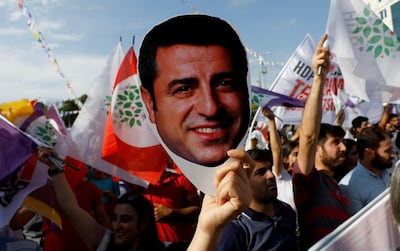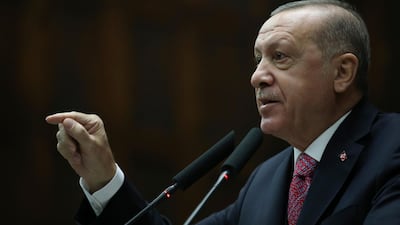Turkish President Recep Tayyip Erdogan on Wednesday intensified his criticism of a former adviser who had suggested the country’s foremost jailed Kurdish dissident could be freed.
After Mr Erdogan’s promises of judicial and democratic reform, his adviser Bulent Arinc last week speculated that Selahattin Demirtas, the former leader of Peoples’ Democratic Party (HDP), could be released after more than four years in prison.
His comments were quickly criticised by nationalists supporting Mr Erdogan’s government.
At the weekend, the president distanced himself from Mr Arinc, a former deputy prime minister and one of the founders of Mr Erdogan’s Justice and Development Party (AKP).

Mr Arinc on Tuesday resigned as a member of the president’s advisory board, a role he held for about 18 months.
Mr Erdogan said he was offended by Mr Arinc’s remarks that people should read the book Mr Demirtas wrote in prison to understand the situation for Turkish Kurds.
Mr Demirtas is among thousands of HDP members imprisoned for alleged ties to the Kurdistan Workers' Party (PKK), which has been designated a terrorist organisation by Turkey, the EU and the US.
The group is fighting a 36-year insurgency that has led to tens of thousands of deaths.
“Recommending a book written by one of these terrorists truly offended me,” Mr Erdogan said in a televised speech to AKP deputies in parliament on Wednesday.
He described Mr Demirtas as “an advocate of a terrorist organisation who has the blood of thousands of my Kurdish brothers, soldiers, police, teachers on his hands and who seeks separatism while wearing a political mask".
Mr Erdogan also defended the replacement of dozens of elected HDP mayors with government-appointed trustees as beneficial to Turkey’s Kurdish-majority region.
Mr Arinc, who was widely ridiculed in 2014 when he said women should not laugh in public, is the second high-profile AKP figure to quit this month after the resignation of Berat Albayrak, Mr Erdogan's finance minister and son-in-law.
Since Mr Albayrak’s departure, talk of reform has led to speculation that Mr Demirtas and philanthropist Osman Kavala, another prominent figure who has been in prison for more than three years, would be released.
This was accompanied by reports of friction in the AKP’s coalition with the Nationalist Action Party (MHP), which gives the government a parliamentary majority through its 48 MPs.
The MHP is staunchly opposed to any compromise with the Kurdish movement.
In another development, veteran Kurdish politician Mehmet Ihsan Aslan, a former AKP MP for Diyarbakir, was referred to the party's disciplinary committee this week for criticising Mr Erdogan and the AKP, including over the handling of a peace process with the PKK that broke down five years ago.
“Kurds want a simple thing – justice,” Mr Aslan said last week. “Ankara either doesn’t know what the Kurds want, or it knows but is just standing by.”
Mr Erdogan said the reforms, including economic proposals, would be carried out after next month’s budget debates. He said a human rights action plan would also be implemented.
Many observers regard the economic reforms as urgently needed to prevent economic ruin.
Political and legal changes are said to be an attempt to appease the EU, which has threatened to impose sanctions over Turkish foreign policy, and the incoming US administration, which is believed to place greater emphasis on human rights.
Opposition leaders, meanwhile, called for early elections to be held before planned polls in 2023 to secure stability.
“Turkey can't go on like this,” Iyi Party leader Meral Aksener said.
Ms Aksener said there was a lack of confidence in the rule of law, government accountability and the economy.
“Of course, we want elections. We want them so the people are comfortable,” she said.

